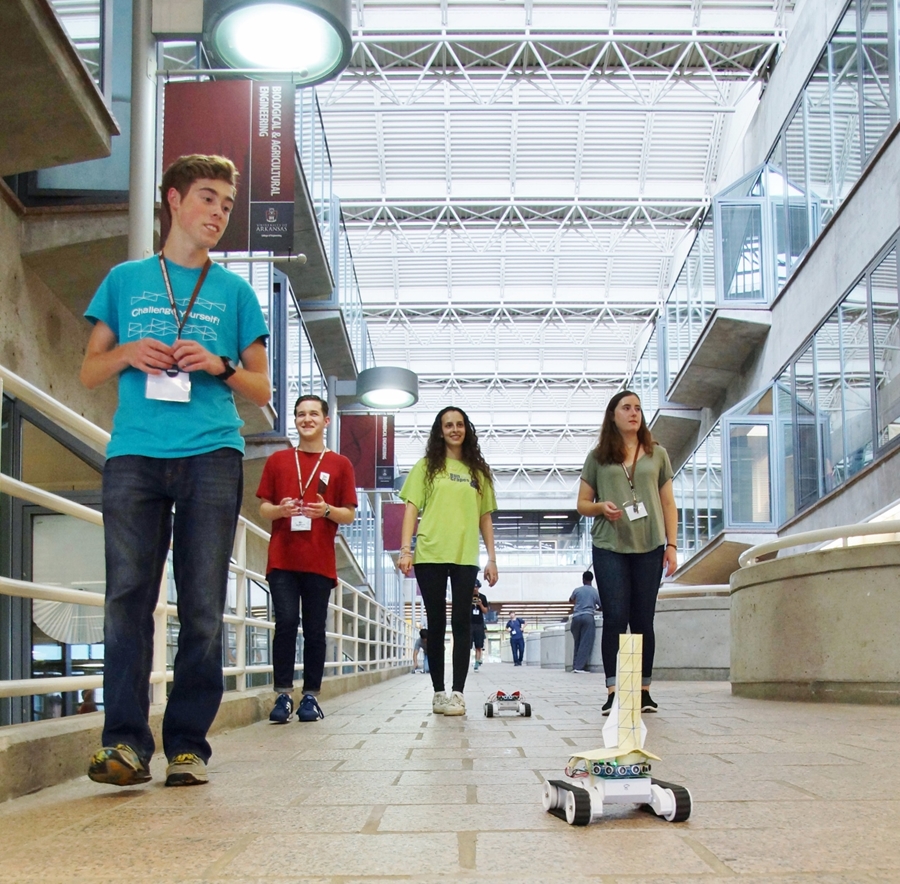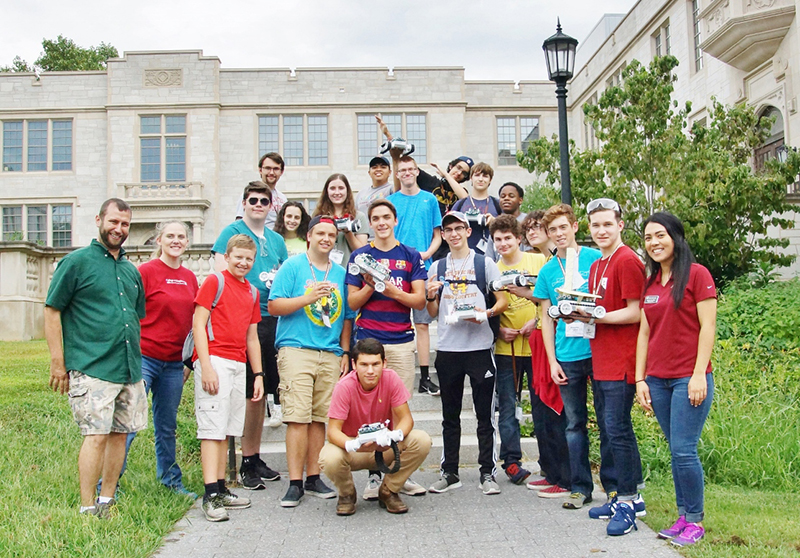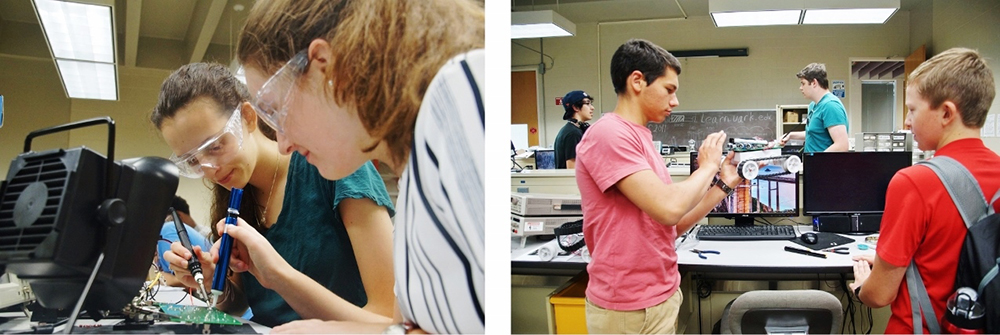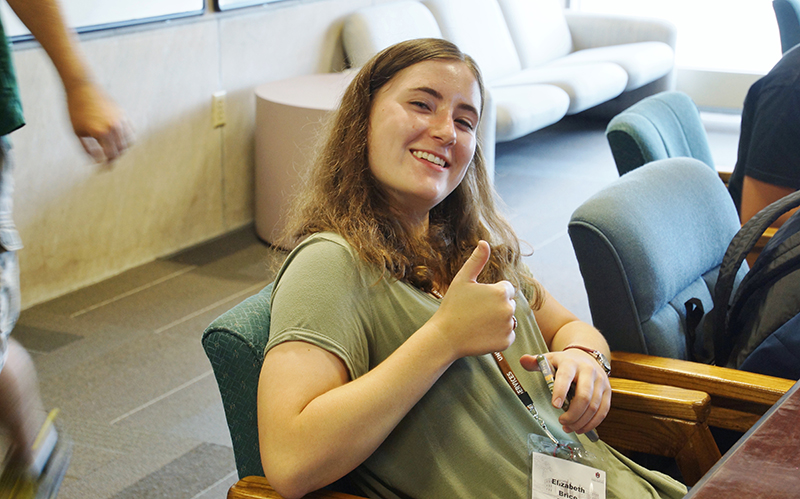High School Students Learn Electrical Engineering Basics at Engineering Summer Academy

High school students Ben Tyrrell, Ben Anderson, Ruth Glauber, and Elizabeth Brice test their autonomous robots on the Bell Engineering ramp.
More than 70 high school students from Arkansas and beyond attended the University of Arkansas Engineering Summer Academy from July 23-29. The College of Engineering hosts several camps each summer for students in grades 3-12, as well as a one-week, residential learning experience in a specific engineering program. Current offerings are biomedical, chemical, computing, and electrical engineering.
During their time in the academy, students are given the chance to work on specific projects within their focus area, giving them greater insight into engineering in practice as well as a glimpse of the college life of an engineering student here at the University of Arkansas.
The electrical engineering section was organized and ran by assistant department head, Robert Saunders, with the assistance of Dr. Silke Spiesshoefer, clinical assistant professor. This year's electrical engineering section was attended by 18 high-school students who spent the week building an autonomous, obstacle avoidance robot and learning the basics of electrical engineering design, application, and manufacturing.
"In today's world, students have access to so much knowledge and technology at a touch of a button," stated clinical assistant professor, Silke Spiesshoefer. "Technology is such a natural part of their lives that sometimes the wonder of how it all works is overlooked. I believe it is our job as professors in this field to encourage the young minds of today to learn, discover and innovate. One way of accomplishing this task is to provide a means of hands-on learning, giving them an avenue to explore through doing, and a chance to ask why and how things work."
|
The electrical engineering academy section with clinical assistant professor Silke Spiesshoefer and camp assistants Grey Abernathy and Igliana Castillo-Hernandez. |
In their week at the academy students learned not only how to solder both through hole and surface mount components, but also the basics of voltage regulation, timer chips, obstacle sensors, logic gates, comparator devices, pulse width modulation (PWM), and motor drivers.
The circuit board was divided into sections to allow students to test for proper function capability before moving forward. This allowed students to experiment with various types of test equipment, such as an oscilloscope, power supply, and multimeter.
|
Left: Ruth Glauber and Elizabeth Brice solder the circuit board that will program their autonomous car. Right: Aiden Lemly tests his autonomous robot for motion sensitivity. |
"I was really excited this week to learn about circuits and how they work to create an autonomous robot," Nathaniel Jones from Little Rock said. "I love how one thing connects to another and how that helps me understand the experience of electrical engineering."
Many students attend the Engineering Summer Academy to learn about different engineering disciplines. Other students, like rising senior Farod Muhammad, have an idea of what they want to focus on in college and want exposure. "I want to work in automation. I chose the electrical engineering camp because that's the background an automation engineer needs," said Muhammad. "Plus I think it's good to get early experience before you actually come to college."
In addition to learning the skills and concepts associated with their project, students also visited specific locations in Northwest Arkansas to learn about automated electronic assembly and manufacturing of components. The students visited Delta Group Inc. to see how the soldering and testing process can be automated in an industrial setting as well as one of the University of Arkansas research centers, the High Density Electronics Center (HiDEC), to see the clean room facilities in which chips are made through wafer level processing. The students also visited the National Center for Reliable Electric Power Transmission (NCREPT) to speak with test engineer, Chris Farnell about the research going on in reliable electric power transmission at the University of Arkansas.
|
Rising senior Elizabeth Brice said that this camp made her confident in her choice to study electrical engineering. She summarizes her experience with a thumbs up. |
Topics
Contacts
Robert Saunders, professor and assistant department head
Department of Electrical Engineering
479-575-4037,
rsaunder@uark.edu
Amy Warren, assistant director of outreach and summer programs
College of Engineering
479-575-2562,
alwarren@uark.edu
Headlines
PetSmart CEO J.K. Symancyk to Speak at Walton College Commencement
J.K. Symancyk is an alumnus of the Sam M. Walton College of Business and serves on the Dean’s Executive Advisory Board.
Faulkner Center, Arkansas PBS Partner to Screen Documentary 'Gospel'
The Faulkner Performing Arts Center will host a screening of Gospel, a documentary exploring the origin of Black spirituality through sermon and song, in partnership with Arkansas PBS at 7:30 p.m. Thursday, May 2.
UAPD Officers Mills and Edwards Honored With New Roles
Veterans of the U of A Police Department, Matt Mills has been promoted to assistant chief, and Crandall Edwards has been promoted to administrative captain.
Community Design Center's Greenway Urbanism Project Wins LIV Hospitality Design Award
"Greenway Urbanism" is one of six urban strategies proposed under the Framework Plan for Cherokee Village, a project that received funding through an Our Town grant from the National Endowment for the Arts.
Spring Bike Drive Refurbishes Old Bikes for New Students
All donated bikes will be given to Pedal It Forward, a local nonprofit that will refurbish your bike and return it to the U of A campus to be gifted to a student in need. Hundreds of students have already benefited.







